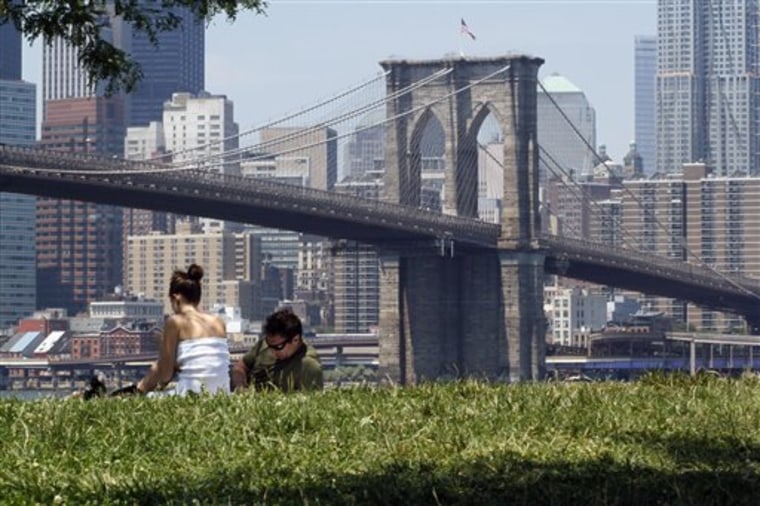Americans got used to staycations during the recession, but as the economy begins to recover many are now ready to graduate to the short-stay getaway for relaxation and adventure without the financial drain of a longer vacation.
Here are some tips for short trips that are both fun and frugal.
Location, location
Nearby or easy-access destinations are most likely to offer clear ways to reduce expenses. Consider metropolitan areas like New York, Chicago or Los Angeles, where you can get around at very low cost because you can walk or take public transportation to most activities.
Las Vegas is among many experts' top picks for a short trip because hotels and flights are plentiful and deals abound. Many Sin City establishments still offer discounted food and beverages, says Chris Russo, president of the American Society of Travel Agents. For the best prices Rick Ingersoll, author of "The Frugal Travel Guy Handbook," recommends hitting Las Vegas at midweek, as gambling destinations usually see more demand — and charge more — on weekends.
Also consider Orlando, Fla., where a lodging surplus gives travelers ample opportunity to score cheap rates, while many local attractions offer discounts and packages.
Roughing it
A great way to keep food and lodging costs roughly the same as if you stayed home is to camp — assuming you don't need to buy much new gear. A pass to all the national parks in the country costs $50 a year. Some national parks also offer free access on certain dates, some are always free to enter, and there are multiple discount programs. Check www.nps.gov for details. Camping fees are usually less than $10 a night in state or national parks. Private campgrounds tend to charge more, though some provide more services.
Fly away
Time is of the essence when you only have a few days to unwind, making air travel a logical choice. So don't shy away; just keep your options open because prices depend on lots of factors, including the carrier and competition, says Hotwire group president Clem Bason.
Many vacationers assume shorter flights will be cheaper, but that's not always so. For example, Bason says, fares between New York and Los Angeles or San Francisco are competitive because there are many available. And short flights cost less in the West than on the East Coast because more low-cost carriers compete to serve Western travelers.
As with lodging, Ingersoll suggests checking midweek and Saturday for the lowest rates. And pack light to avoid checked-baggage fees and the time and hassle involved in retrieving your luggage after you land.
Drive carefully
With gasoline topping $4 a gallon in many places and running higher in others, you'll want to limit your driving time. Websites like gasbuddy.com or fuelcostcalculator.aaa.com can tell you what to expect to pay at the pump and help you get strategic. For instance, if you can fill up in New Jersey instead of Manhattan, you could pay $3.69 a gallon, a savings of more than 50 cents a gallon. Likewise, driving from Reno to Yosemite National Park, you will save almost $1 a gallon buying regular gasoline in Carson City, Nevada, instead of Lee Vining, Calif., near the park entrance about 100 miles south. That could mean savings of $20 on a tankful.
And don't feel obligated to take your own car. It could be much cheaper to drive a rental than your own vehicle because most rental companies offer unlimited mileage — so you will save the wear on your own vehicle — and because you can choose a rental that gets better mileage than your car. Ingersoll also reminds drivers to keep their tires properly inflated and use air conditioning only when necessary to help with mileage (though studies have shown open windows can also drag down mileage when you're driving fast).
Once you arrive at your destination, try to leave your car parked. Check online for parking coupons and discounts. Best would be a hotel that offers free parking. Also check for nearby garages that charge less and let you reserve a spot before you leave home. Save on airport parking the same way.
Cruise control
Cruise companies offer a bevy of three- to five-day packages, with trips to the Caribbean still among the most popular. Bason says cruises from the East Coast to the Bahamas can cost less than $200 a person, not including airfare, while cruises to Eastern Canada start around $300 for four days. Or do a cruise to nowhere, where you don't stop at any ports. Those start as low as $200 a person, with the price depending on the number of days, type of room and departure port you choose.
Bason also says patience can pay off in booking a cruise.
"If you have the time to watch and wait, you could save hundreds of dollars," he explained.
Just remember to check you're actually getting a deal once you add in alcoholic beverages, specialty restaurants, entertainment and other extras. (Bason also recommends calling ahead to nail down those charges and make any necessary extra reservations.)
